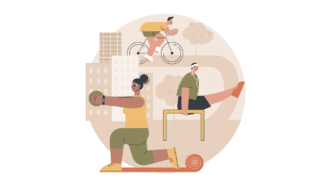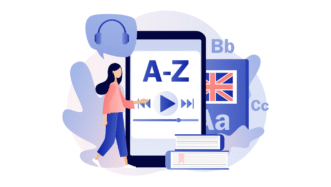LESSON OVERVIEW
The main objectives of this lesson are to:
- learn essential beginner vocabulary to describe the weather;
- share preferences on weather and seasons;
- watch and discuss a video about the weather in Bali.
With this lesson, students learn weather vocabulary for beginners! They match descriptions with pictures and watch a video about the weather in Bali. They talk about the kind of weather they like and don’t like, and their favourite seasons. They learn how to describe everyday weather, as well as talking about the weather in different countries. Students also engage in useful contextual language practice in relation to weather.
WARM-UP, VIDEO, AND VOCABULARY
Students begin learning weather vocabulary for beginners with a fun warm-up. They match words with their associated seasons (e.g. green – spring, ice-cream – summer) . Next, they answer questions using seasons for answers (e.g. When is your birthday?). After that, students read sentences that contain bolded words (e.g. snow, clouds, rain). They look at pairs of pictures and choose the correct picture for each word in bold. Then, they look at pictures and describe them using the vocabulary from the previous task3. Following that, students do a ‘this or that’ exercise to discuss their weather preferences (e.g. sun and snow vs rain and wind). Then, they watch a video about the weather in Bali, Indonesia. Students say which words in the box they think they will hear (e.g. wind, sun). They watch the video and complete gaps with the correct words, according to the information from the video.
MORE PRACTICE
Students continue practising weather vocabulary for beginners by completing a mind-map which contains the question ‘What’s the weather like?’. The mind-map gives students nouns (e.g. rain) and they produce adjectives (rainy). Next, students match sentences to pictures to learn more words (cold, hot, warm) . Afterwards, students choose the correct word to complete sentences (e.g. I don’t like it when it’s cloudy/cloud). Then, students have useful contextual language practice and complete sentences correctly (e.g. Take your umbrella – it’s rainy today). After that, students read sentences and finish them with their thoughts (e.g. I like autumn because…). Next, they choose five places from a list (e.g. London, Alaska, Kenya), and answer the question, ‘What’s the weather like in…’?. Students finish the lesson on weather vocabulary for beginners by looking at different pictures with a partner. Each partner describes their picture and together, they find one similarity between the two.
WORKSHEETS
Subscribe to unlock these and many other Standalone lesson with the Premium plan
Subscribe











The attached video is very hard to understand. I find even my more advanced students struggling to understand what the person is saying. Otherwise a good lesson.
Thank you for your feedback! We understand that the video might be challenging, and sometimes even after listening a few times, it can still be difficult to grasp. In such cases, teachers might find it helpful to repeat or paraphrase what the speaker says to support student comprehension. We’re glad to hear you found the rest of the lesson good 🙂
I suggest copying the transcript
“somebody gives everything to everybody I
love the rain I got the rain she loves
the sun we got the Sun
there five minute difference”.
In addition, I always find a funny way to work with the vocabulary… for instance ” In Bali, ” you like the sun, you get the sun, you like the rain, you get the rain.